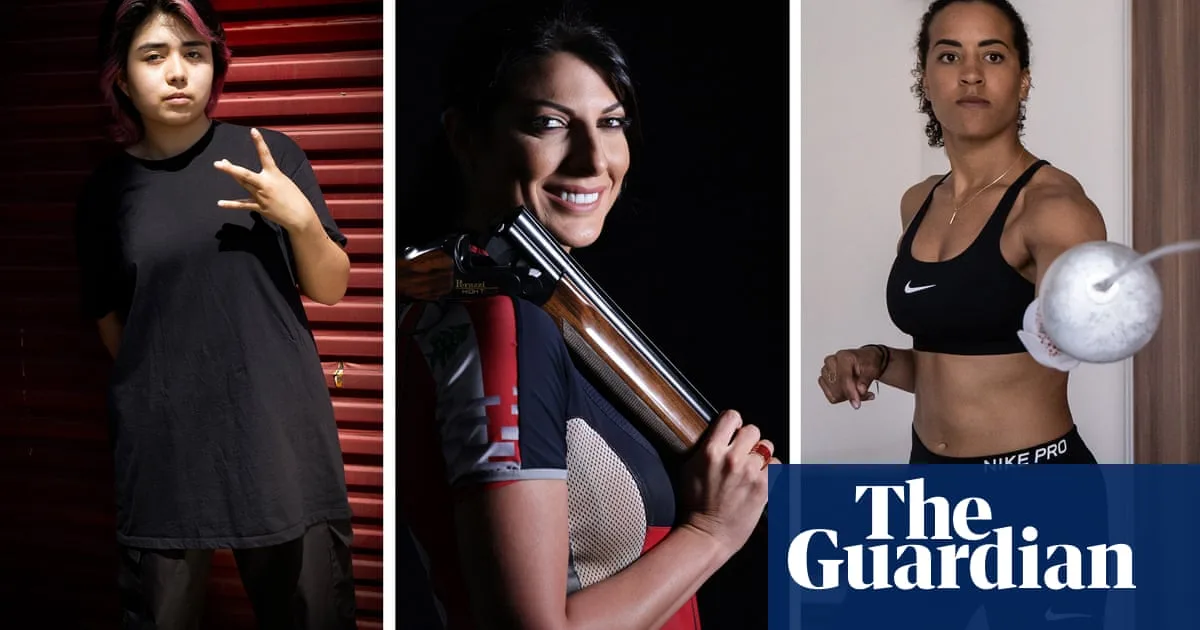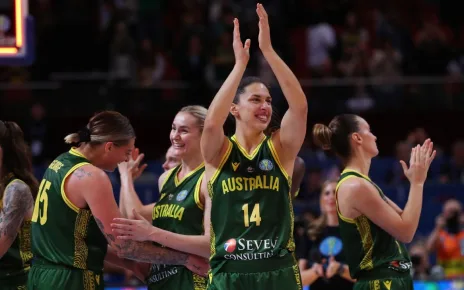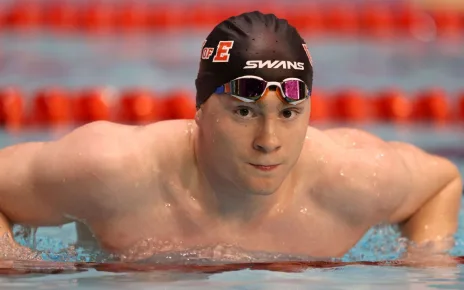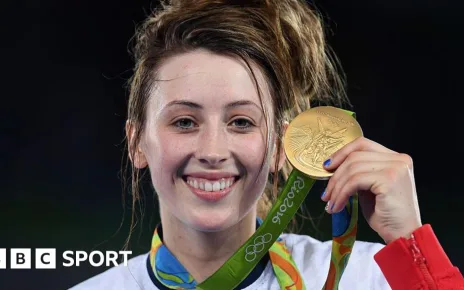
The épée fencer: Alexandra Ndolo, Kenya
One of Alexandra Ndolo’s greatest career achievements so far is winning a silver medal for Germany at the world fencing championships in Cairo in 2022. But when the daughter of a Polish mother and Kenyan father looked up and saw the Kenyan flag hanging from the roof of the arena for the one athlete who hadn’t won anything, she had a moment of reckoning.
“Even though that [Kenyan athlete] didn’t win, and I did, I saw that flag at [the championship held] on the African continent and somehow it gave me this idea. I thought, ‘You know what, I think you could make something out of this, and your efforts could help to build something.’”
Ndolo, 37, who says she feels German, Polish and Kenyan in equal measure, switched her allegiances to Kenya in épée fencing two months later. On 27 July, she will be the first fencer to represent the country at the Olympics, to be held in Paris.
“I want a medal. I’m not going just to participate. That’s never been my style,” she says. “I’m doing it more for the Kenyan people than myself. I’m trying to do this for the whole country and to also show that Africans are capable.”
Ndolo’s involvement in Kenyan fencing dates back to the end of 2014 when she started donating equipment and clothes. Later she went to a couple of international conferences on behalf of the country. In 2019, she co-founded the Kenya Fencing Federation to raise awareness and to enable Kenyan athletes to compete on the world stage.
Then the pandemic hit and progress halted. Ndolo knew that for the foundation to get more funding and recognition, it needed a champion. “I thought, I can wait for 14 years until we have a homegrown Kenyan champion. Or I can switch and use my platform to grow the sport and introduce it to the country,” she says.
When she announced she would fence for Kenya, some people were bemused. They didn’t know what the sport was and why athletes wore white suits. Some thought it involved building fences.
Since then, Ndolo has continued to train at her club in Cologne, going to Kenya once a year. At her first competition representing Kenya, she was moved to tears when her name was announced. She has seen awareness and recognition of the sport grow, in large part due to her achievements. She has won the African championships twice, and qualified for the Olympics, generating media coverage in the process.
She’s also proud that the federation’s training has kept children off the streets in a poorer area of Nairobi. “We’ve had kids coming in years later and telling us that it kept them out of trouble,” says Ndolo.
While she has no regrets, Ndolo has had a frustrating two years since her switch. She has almost entirely financed herself when travelling to competitions in Canada, Qatar and China with little help from the Kenya Fencing Federation. Her Olympic campaign is being funded by the country’s National Olympic Committee.
She says: “I think what really needs to change is the fact that many African federations could be run better, including the Kenya Fencing Federation. There’s not much transparency.”
Ndolo remains proud to represent the Kenyan people. “Kenyans will support any champion, any effort, they’re so enthusiastic and it’s just so much fun,” she says. “It’s beautiful to see that I can put a smile on people’s faces.”
Words by Sarah Johnson
The trap shooter: Ray Bassil, Lebanon
The only Lebanese athlete who qualified for the Paris Olympics is a woman who hopes to bring a medal home to a country grappling with war and poverty.
Ray Bassil answers her phone from Lonato, Italy, where she is competing as a trap shooter in the Shooting World Cup, the 35-year-old’s last competition before Paris.
The athlete trains both in Italy and in Lebanon, where 32% of the population was believed to own a weapon in 2017, and where stray bullets frequently lead to casualties.
Since October, Israel and the Lebanese pro-Hamas militia Hezbollah have been exchanging fire on a daily basis. The threat of a war has dramatically added to instability.
“It is hard, it is stressful, and it is a lot to process,” she says. “There is a possibility that the airport will be closed or bombed, preventing me from flying to the Olympics,” she says.
Trap shooting is a discipline of competitive clay pigeon shooting – the aim is to hit the clay flung into the air by a machine: the trap.
Bassil’s mother, Joyce Bassil, says her daughter “grew up in a sporty family” – both she and her husband were volleyball champions. “Ray started hunting with her dad when she was eight.”
She initially had mixed feelings when her daughter started shooting. “I was worried. She would come home with a bruised shoulder and cheek, [because of the kickback].” Ray competed for the first time on the international stage at 15, winning a gold medal.
People were surprised, she says, that a young girl would love a sport seen as masculine. “The way people think is changing,” says Ray. “!t is still very helpful to show that women can achieve good results.”
Bassil has won eight World Cup medals and came 21st at the Tokyo Olympics in 2020. On her right ankle, a tattoo commemorates four qualifications for the Olympics: 2012, 2016, 2020 and 2024. “Taking a medal home would create hope for my country and for Arab women,” she says.
Bassil lives in Beirut, and drives her SUV, with her golden retriever Leo in the boot, to train at the shooting facility in Batroun, a city an hour’s drive up the coast. Preparing for the Olympics in a bankrupt country is a challenge. Lebanon is going through a crisis “likely to rank among the 10, or even three, most serious worldwide since the mid-19th century”, according to the World Bank. More than half of the population live below the poverty line.
After working in the family restaurant, she now works in trading. “Trading is not my career but I have no choice: in Lebanon we don’t receive social benefits if we lose our job,” she says. She says she has not “received money from the relevant Lebanese institutions to prepare for the Games. I have had to fend for myself, with sponsors helping me.”
after newsletter promotion
One of her coaches, Daniel Ghanime, says it’s important to work on what can be controlled. “We have to let go of what is beyond our control,” he says.
Joyce Bassil has faith in her daughter. “This year, Ray sacrificed a lot. I believe she will come back with an Olympic medal,” she says.
Words by Laure Delacloche in Beirut
The breakdancer: Manizha Talash, Afghanistan
The first time Manizha Talash saw breakdancing was on Facebook and she couldn’t believe it was happening right there, in her own city of Kabul.
“I thought it was fake and they were using some sort of filter,” Talash explains in excellent Spanish on a hot afternoon in the Villa de Vallecas neighbourhood of Madrid where she trains.
“I sent an email to Jawad Sezdah, the guy in the video who is now my teacher, and a few months later he invited me to come to the club and that’s when I started breaking. I was 17 and the only girl. I was too shy to dance at first but soon I was all over YouTube and social media and everyone knew I was dancing.”
This month the 21-year-old will be in Paris, breaking as part of the refugee team at the Olympics.
As the only B-girl, as the performers are known, in a Kabul society that frowned on dancing, she became something of a local celebrity. Not everyone liked what she was doing and, after a series of bomb attacks, the club where she danced was forced to close.
Then in August 2021, Kabul fell to the Taliban and suddenly there was no place for Talash or the B-boys and rappers from the club. She worried that her celebrity would put her family at risk and, fearing the worst, Sezdah helped her and the rest of the crew escape over the border to Pakistan.
To protect her family, she adopted the surname Talash, which means effort or striving in Dari, the majority language in Afghanistan. Stateless and without a passport, she spent a year stuck indoors in Pakistan, unable to train, before being airlifted out on a Spanish military plane.
She and other members of the crew found themselves in the small Aragonese town of Huesca while the rest of the group ended up hundreds of kilometres away in either Murcia or Madrid. A local man let them use his gym to train and Talash worked as a hairdresser and set about learning Spanish.
She moved to Madrid early this year, where she was reunited with Sezdah, and emailed Olympic contacts asking to be entered as a refugee. She was accepted and will be Spain’s only refugee entry.
Last month her mother, sister and two brothers also managed to get out of Afghanistan and are now in a hostel for refugees in Villa de Vallecas.
“My mother has always helped me to realise my dreams,” Talash says. “At first she didn’t think being a B-girl was what I should be doing but now she supports me.”
In Afghanistan, breaking is out of the question not just for girls, but for boys as well, she says. “But I don’t accept the norms, it’s my life and my future. I don’t care what people think or say.”
Recently she has noticed a change in the comments left on her Instagram. Before they were critical, people – girls included – saying it wasn’t right for a girl to be doing what she did, that she should cook and clean.
“Now, the girls who are in Europe or elsewhere, say, ‘oh, this is great, I want to do it too’. But for girls in Afghanistan this is impossible, they’re not allowed to study or even leave the house.
“I want to go to the Games to do something for them,” she says. “But they don’t need me to tell them what to do, they’re all heroes in their own lives.”
“I’m a young woman who just wants to do a sport that I enjoy a lot but I can’t live in my country. As for the Taliban, I don’t have anything to say to them because they wouldn’t listen anyway.”
Words by Stephen Burgen in Madrid



